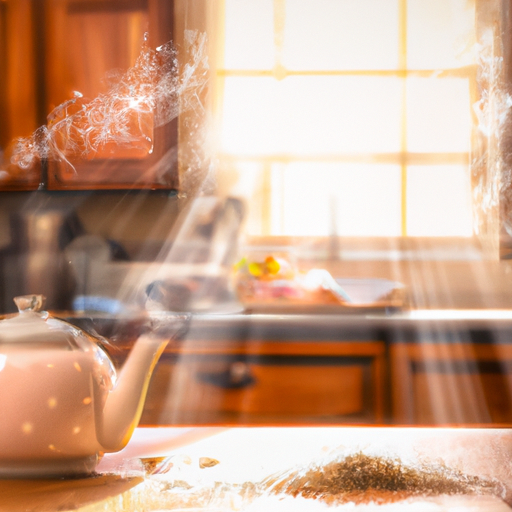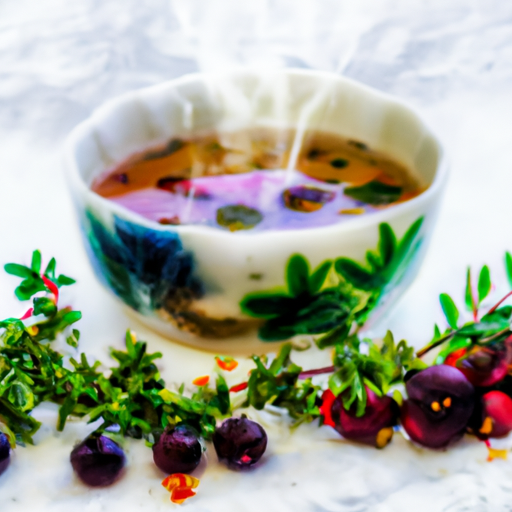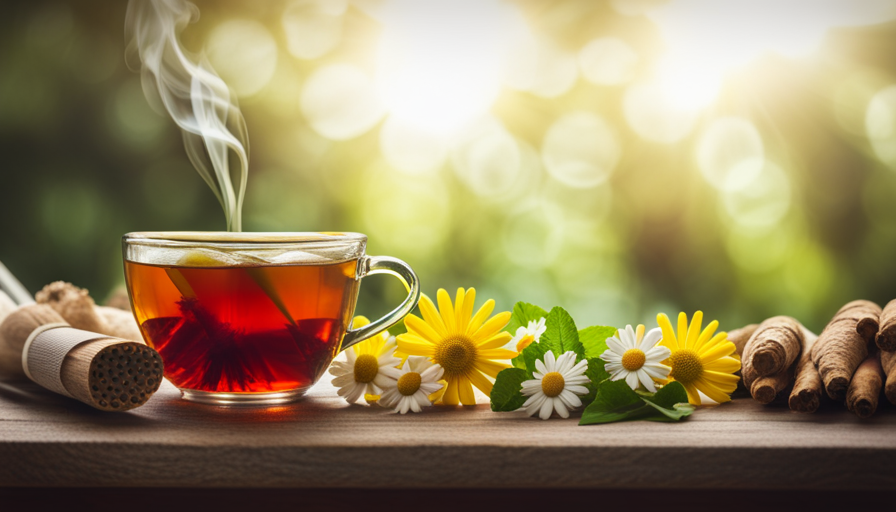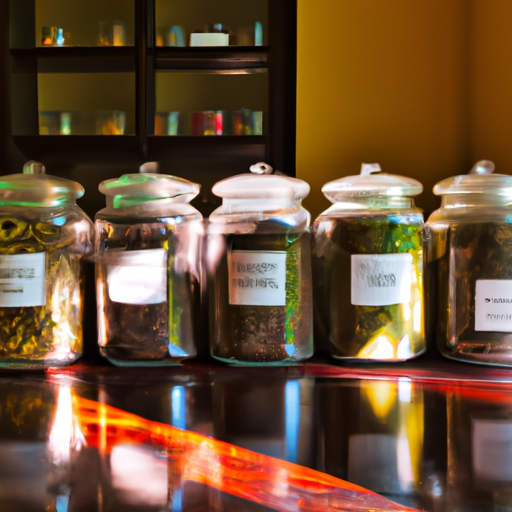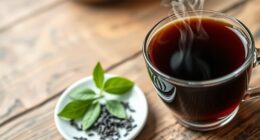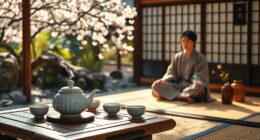When it comes to tea, there is a wide variety of flavors and types to choose from. But did you know that not all teas are made from tea leaves? Some teas are actually herbal infusions, made from a blend of natural herbs and plants. These herbal teas offer a unique and refreshing experience, with each type boasting its own distinct flavor and health benefits.
Let’s explore the world of herbal teas together. From the calming and soothing Chamomile Tea to the invigorating Peppermint Tea, these herbal brews are sure to delight your senses.
If you’re looking for a spicy kick, try the warming Ginger Tea or the sweet and nutty Rooibos Tea.
For a vibrant and tangy option, you can’t go wrong with Hibiscus Tea or Lavender Tea.
And if you’re in need of a mood booster, the zesty Lemon Balm Tea might just do the trick.
So, whether you’re looking for a moment of relaxation, a burst of energy, or a flavor adventure, these herbal teas have got you covered. Get ready to embark on a journey of taste and wellness with these delightful herbal infusions.
Key Takeaways
- Herbal teas are made from natural herbs and plants, not tea leaves.
- Herbal teas offer unique flavors and health benefits.
- Chamomile tea promotes relaxation and better sleep.
- Peppermint tea soothes an upset stomach, relieves respiratory issues, and reduces stress.
Chamomile Tea
Chamomile tea, with its calming properties, is a perfect choice for those seeking a soothing and relaxing herbal tea option. It is made from the flowers of the chamomile plant. This tea has been used for centuries to promote relaxation and relieve anxiety. The tea’s unique blend of antioxidants and anti-inflammatory compounds can help reduce inflammation, soothe an upset stomach, and even promote better sleep. Its mild, floral flavor is both comforting and refreshing, making it a popular choice for unwinding after a long day.
As we transition into the next section about peppermint tea, it’s worth noting that chamomile tea and peppermint tea share similar qualities in terms of their soothing effects on the body.
Peppermint Tea
Take a sip of this refreshing brew that carries the invigorating essence of a cool and minty garden, transporting you to a serene oasis of relaxation. Peppermint tea, derived from the leaves of the peppermint plant, has been cherished for centuries due to its numerous health benefits. Here are three reasons why peppermint tea is a must-try:
-
Digestive Aid: Peppermint tea is known for its ability to soothe an upset stomach and alleviate digestive issues like bloating and indigestion. The natural compounds in peppermint help relax the muscles of the gastrointestinal tract, promoting healthy digestion.
-
Respiratory Relief: The menthol in peppermint tea acts as a natural decongestant, providing relief from nasal congestion, sinusitis, and coughs. It can also help soothe sore throats and reduce inflammation.
-
Stress Buster: The refreshing aroma and cooling effect of peppermint tea have a calming effect on the mind and body, making it an excellent choice for reducing stress and promoting relaxation.
As we delve into the benefits of ginger tea, let’s explore how this spicy brew can enhance your well-being.
Ginger Tea
Ginger tea is a popular herbal tea known for its numerous health benefits. It’s rich in anti-inflammatory properties, which can help reduce inflammation in the body and alleviate symptoms of conditions such as arthritis.
Additionally, ginger tea is often used as a natural remedy for nausea relief. It’s a go-to choice for those experiencing motion sickness or morning sickness during pregnancy.
Anti-inflammatory Properties
Sipping on a warm cup of herbal tea can help soothe your body and reduce inflammation, providing a comforting and healing experience.
One herbal tea that stands out for its anti-inflammatory properties is ginger tea. Ginger contains compounds called gingerols, which have been found to possess powerful anti-inflammatory effects. These compounds work by inhibiting the production of inflammatory chemicals in the body, helping to alleviate pain and swelling. Additionally, ginger tea has been shown to reduce the activity of certain enzymes that contribute to inflammation.
So, if you’re looking for a natural way to ease inflammation in your body, ginger tea is definitely worth a try.
Now, let’s move on to the next section and explore how herbal teas can provide relief from nausea.
Nausea Relief
If you’re feeling queasy, a warm cup of a certain soothing beverage can bring quick relief. Herbal teas have long been used to alleviate nausea and promote digestive health. Some herbal teas that are known for their nausea-relieving properties include ginger tea, peppermint tea, and chamomile tea.
Ginger tea is particularly effective in reducing nausea caused by motion sickness or morning sickness. Peppermint tea has a calming effect on the stomach and can help relieve nausea and indigestion. Chamomile tea is gentle on the stomach and can soothe digestive discomfort. These herbal teas work by relaxing the muscles of the gastrointestinal tract and reducing inflammation. They can also help with bloating, gas, and stomach cramps.
Now, let’s move on to the next section about rooibos tea, which has its own unique benefits for health and well-being.
Rooibos Tea
You’ll be surprised by the rich and earthy flavors of Rooibos Tea, a herbal tea that’s known for its vibrant red color.
Rooibos tea is made from the leaves of the Aspalathus linearis plant, which is native to South Africa.
Here are four key things you should know about Rooibos tea:
-
Caffeine-free: Unlike traditional tea, Rooibos tea is completely caffeine-free, making it a great choice for those who want to avoid stimulants.
-
Antioxidant-rich: Rooibos tea contains a variety of antioxidants, including aspalathin and nothofagin, which can help protect against oxidative stress and promote overall health.
-
Soothing properties: Rooibos tea has been traditionally used to soothe digestive issues and promote relaxation. It can also help alleviate allergies and skin conditions.
-
Versatile: Rooibos tea can be enjoyed hot or cold and can be brewed on its own or blended with other herbs and flavors to create unique and delicious combinations.
Transitioning into the next section about hibiscus tea, this vibrant herbal tea offers its own set of benefits and flavors.
Hibiscus Tea
Transitioning into the world of hibiscus tea, get ready to experience the burst of flavor and numerous health benefits that this vibrant brew has to offer. Made from the dried petals of the hibiscus flower, this tea boasts a tangy and tart taste that’s both refreshing and invigorating.
Not only does it have a delightful flavor, but hibiscus tea is also rich in antioxidants, which can help fight inflammation and support heart health. Additionally, studies have shown that hibiscus tea may help lower blood pressure and cholesterol levels. So, if you’re looking for a tasty and healthy alternative to traditional teas, hibiscus tea is definitely worth a try.
Moving on to lavender tea, prepare to indulge in a soothing and aromatic experience.
Lavender Tea
Get ready to relax and unwind with a cup of lavender tea—it’s like a fragrant hug for your senses. Lavender tea is made by infusing the dried lavender flowers in hot water, releasing their soothing aroma and delicate flavor.
This herbal tea has been used for centuries to promote relaxation and relieve stress. It’s known for its calming properties, helping to ease anxiety and improve sleep quality. Lavender tea is also believed to have anti-inflammatory and antioxidant benefits.
Sipping on a warm cup of lavender tea can be a wonderful way to wind down after a long day, allowing the gentle scent and taste to transport you to a state of tranquility.
Now, let’s move on to the next herbal tea—lemon balm tea—which offers its own unique set of benefits.
Lemon Balm Tea
Steeped in hot water, the fragrant lemon balm leaves release a burst of citrusy aroma, transporting me to a sunny garden with every sip.
Lemon balm tea, derived from the Melissa officinalis plant, is a popular herbal tea known for its calming and soothing properties. It’s been used for centuries to alleviate anxiety, promote relaxation, and improve sleep quality.
This tea is also rich in antioxidants, which can help boost the immune system and protect against oxidative stress.
Lemon balm tea has a mild, refreshing taste with hints of lemon and mint, making it a delightful beverage to enjoy throughout the day. It can be served hot or cold and pairs well with honey or a slice of lemon.
Incorporating a cup of lemon balm tea into your daily routine can provide a moment of tranquility and overall well-being.
Frequently Asked Questions
How long should I steep chamomile tea for maximum flavor?
To achieve the maximum flavor from chamomile tea, steep it for about 5-7 minutes. This allows the soothing flavors to fully infuse into the water, creating a delightful and calming cup of tea.
Can peppermint tea help with digestion issues?
Peppermint tea can help with digestion issues due to its natural properties that soothe the gastrointestinal tract. It can ease symptoms like bloating, indigestion, and stomach cramps, making it a great choice for digestive health.
Is ginger tea safe to consume during pregnancy?
Ginger tea can be safely consumed during pregnancy. It’s known to alleviate nausea and morning sickness. However, it’s important to consult with a healthcare professional before adding any new herbal tea to your routine.
Are there any known side effects or interactions of drinking rooibos tea?
There are no known side effects or interactions of drinking rooibos tea. It is generally considered safe for most people. However, it’s always a good idea to consult with a healthcare professional before adding any new herbal tea to your routine.
Can hibiscus tea help lower blood pressure?
Yes, hibiscus tea has been shown to help lower blood pressure due to its natural compounds that act as a diuretic and vasodilator. It can be a beneficial addition to a healthy lifestyle.
Conclusion
In conclusion, herbal teas offer a wide variety of options for tea enthusiasts who’re looking for a caffeine-free alternative. Whether you prefer the calming effects of chamomile tea or the refreshing taste of peppermint tea, there’s a herbal tea out there for everyone.
For instance, Sarah, a busy working mom, discovered the soothing benefits of lavender tea when she struggled with sleep issues. After incorporating it into her bedtime routine, she found herself getting a restful night’s sleep.
So why not explore the world of herbal teas and find your own favorite blend?


